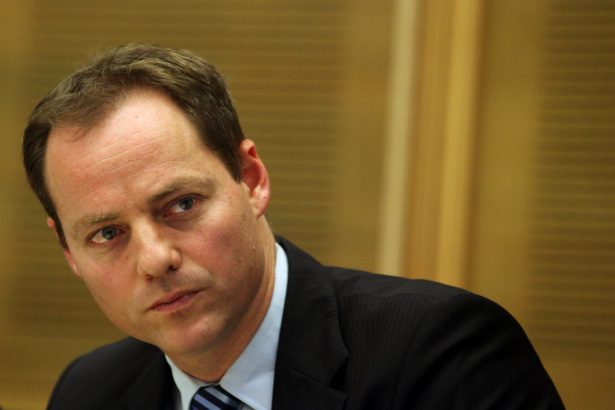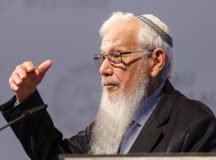Yochanan Plesner, President of the Israel Democracy Institute, argues that in order for Israel to secure a democratic future and manage its internal affairs, it must: reform its political system; create a shared Israeli identity; develop a constitution; build a new relationship between the state and religion; and reach a decision on the Palestinian question.
The miracles of the past
Against all the odds, Israel was born a democracy. Created after the devastation of the Holocaust and during a war for its very survival, Israel faced unprecedented challenges right out of the womb. Jewish refugees from Europe and later, from the Arab world, many from societies with no democratic traditions, had to be integrated into the fledgling state. A wartime economy gave way to a regime of severe austerity; Hebrew, a new language for many, had to be learned before it could begin to unify the nation. Above it all hovered an enduring and existential security threat that, in any other circumstance, would have provided every excuse for dispensing with the rule of law and human rights. Under such conditions, Israel’s Declaration of Independence was nothing short of a miracle: an enlightened document that laid the foundations for a new democracy in an otherwise autocratic region.
This miracle had many fathers. Most important perhaps were the Zionist institutions of the pre-state Yishuv, run according to the principles of representative democracy. These proto-state institutions seamlessly transitioned into real state institutions. Credit also has to be given to the British influence in Mandatory Palestine during that period, and the Zionist leadership’s affinity for the Western liberal democratic order (and not its illiberal competitors). This was a time, after the Second World War, where human freedoms and political rights were deemed universal values. The newest member of the community of nations was no exception and solidly aligned itself with the West. Going back further, however, the impact of millennia of Jewish tradition cannot be discounted. Disputation and debate, persuasion and consensus, were paramount values in most every Jewish community the world over, and so it was in the reborn Jewish State.
Although far from a model democrat, David Ben-Gurion imbued the young state with respect for democratic institutions along with the ethos of mamlachtiut – the primacy of the state and the common good over individual or sectoral interests. To a great extent, these values still form the basis for modern political life in Israel. Functioning institutions, like a professional civil service, independent court system, and the ‘people’s army’ of the Israel Defense Forces, are a legacy of his approach. Elections are held on schedule, and all segments of Israeli society are represented in the Knesset. A peaceful handover of power first took place at the ballot box in 1977 – a real achievement in the Middle East.
Despite the severe security challenges Israel has had to grapple with, including endless acts of terrorism and multiple wars, democracy has not only remained intact but expanded and thrived. Despite the ongoing enmity with many of the surrounding Arab states, Israel managed to lift military rule over its own substantial Arab minority in the mid-1960s, and continues to make strides integrating this group into the broader society and economy. Israeli democracy also proved strong enough to absorb enormous waves of new immigrants that would have brought many more established states to their knees. (Israel’s absorption of 1 million former Soviet Jews in the early 1990s was akin to the United States absorbing France.) The media have only become freer and more critical with time. Controversial decisions – a peace agreement with Egypt, the First Lebanon War, the Oslo Accords, disengagement from Gaza – divided the country but were, in the end, implemented without sacrificing the unity of the nation. Hyperinflation, like in the 1980s, necessitated painful reforms. One prime minister, Yitzhak Rabin, was assassinated by a Jewish extremist; another, Ehud Olmert, was sent to jail. Yet the system has endured.
After 70 years, Israel is today a vibrant, dynamic and resilient democracy. The state does what functioning states are supposed to do: protect its citizens, uphold law and order, and provide basic essential services. Israel’s gross domestic product per capita is nearly $40,000 (£28,500), placing it in the top twenty globally. It was recently inducted into the Organisation for Economic Cooperation and Development (OECD), a group of high-income states committed to both a market economy and democracy. Israeli technology is a marvel of the post-industrial world; the country is referred to, with reason, as the ‘Start-Up Nation.’ Israelis have, for the most part, taken notice of these great achievements. In a recent poll conducted by the organisation I lead, the Israel Democracy Institute (IDI), 84 per cent of Israelis think the country is a good place to live in, with a nearly similar number indicating that they would prefer to stay in Israel, despite all the hardships, even if offered foreign citizenship. 68 per cent of all Israelis are in fact optimistic about the state’s future. Even the majority of Israeli-Arabs – 54 per cent – feel a part of Israeli society.
The present challenges
Yet not everything is rosy. Israeli democracy is still under enormous security pressures, which magnify the vulnerabilities of its democratic institutions and values. The gains of the past cannot be taken for granted in future. Indeed, the last decade has witnessed a disturbing shift in trends. Public rhetoric has grown more extreme, polarising society across various political, religious and ethnic fault lines. The basic notion of mamlachtiut has come under attack, with politicians – even very senior ones – shamefully lambasting state institutions like the Supreme Court, IDF and police. Instead of governing according to consensus and the common good, the political system is widening pre-existing divisions.
In many respects, the new and existential divide in Israeli society is not between Jews and Arabs, religious and secular, nor even between Right and Left. Rather, the new divide is between those who seek a ‘substantive’ democracy, and those seeking a ‘hollowed-out’ democracy – meaning the tyranny of the majority (and, effectively, not a democracy). This divide is also between those who see mamlachtiut as a framework for tolerance and inclusiveness towards ‘the other’ and those who interpret it as the exclusive right of whatever majority is currently in power to promote its short-term electoral interests. This latter approach, unfortunately, tends towards a willingness to sacrifice Israel’s democratic institutions at the altar of narrow political gain.
Legislation put forward in the Knesset these days is too often intended to erode basic constitutional values like freedom of speech and equality (especially as it relates to the Arab minority). Almost as worrisome, the Knesset is the world leader in private bills put forward by individual parliamentarians. These bills are seldom thought out, and rarely have a real chance of passing; their only purpose is to promote the politician’s specific political interest group. The work of the Knesset, Israel’s image in the world, and the public interest all suffer as a result.
It is not a coincidence that public trust in the three institutions that are supposed to reflect the will of the people are at all-time lows. Only 15 per cent of the public trusts the various political parties; 27 per cent of Israeli Jews trust the Knesset (19 per cent among Israeli Arabs); and 30 per cent of Israeli Jews have trust in the government (22.5 per cent among Israeli Arabs). A full 80 per cent of the public believes that politicians are more interested in their own personal interests than the public interest. Once a democracy loses the faith of its people, the path to authoritarian government may be all too short.
Democracy is the art of safeguarding the balance between opposing values like governance and representation, majority rule and minority rights. It is a system where balance, compromise and non-violent conflict management are crucial components. Israel’s political system increasingly seems incapable of finding room for different voices and viewpoints, and undermines crucial norms like the professionalism and independence of oversight bodies. This is the meaning of a ‘hollowed-out’ democracy. The Israeli public has taken notice of this too. So, what can be done?
Five steps to secure a democratic future
The challenge for our current generation, and Israel’s future, is to attempt to settle several systemic questions that have been left unresolved. Only by addressing these issues forthrightly can Israeli democracy successfully manage its many internal tensions.
- Reforming the political system
First, and perhaps most fundamentally, the political system requires reform. A ‘restart’ of Israeli democracy would incentivise those actors (and parties) who work towards inclusiveness, consensus and broad-based agreement. There are many ideas about how such a system could be created (for the essentials of one plan, see here), but the main goal would be to erode the power of narrow, sectoral actors who seek to (politically) blackmail the majority and restore the structural incentives for Ben-Gurion-style mamlachtiyut. Narrow sectoral interests, based on short-term electoral calculations, should no longer be allowed to hold the entire democratic system hostage.
- Creating a shared Israeli identity
Second, we must aspire to re-create a shared Israeli identity. Israel’s shifting demographics have called into question the balance between its various identities: Jewish or democratic, religious or secular, Jewish or Arab, and so on. The lack of consensus between the various ‘tribes’ of Israel (as President Reuven Rivlin called the different sectors that make up contemporary Israeli society) has increased divisions, making the public forum a more aggressive and violent place. Almost every tribe sees itself as both the majority and the minority, both powerful and under threat, at the same time.
Polling data bear this out, to take just two prominent examples. A majority of secular Israeli Jews (55 per cent) are concerned that their way of life is under threat due to the rising power of other demographic groups – despite the fact that secular Israelis are still the largest single social demographic. Moreover, 72 per cent of right-wing Israeli Jews believe that the judicial system, academia, and the media are all left-wing, and make it difficult for the right to govern – despite the fact that the Israeli right has been in power, for most of the past 40 years. A renewed effort is required to find common ground that rises above these tribal divisions, on behalf of the common good.
- Towards a constitution
Third, and related to the above, is the need to work towards a constitution. Israel famously does not have one. But what is needed now is to codify the basic foundational principles upon which the state rests and the basic rules for a ‘substantive democracy.’ A constitution would help reassert the common national identity, formalising the separation of powers between the system’s various branches and affording each sector necessary legal protections. In particular, a constitution would decrease the chances of anti-democratic legislation being proposed, restraining the impulse for majoritarian rule.
- Church and State: towards a new relationship
Fourth, the relationship between religion and state sorely needs updating. The status-quo established by David Ben-Gurion seven decades ago between mainstream Zionist society and the ultra-Orthodox (or Haredi) sector is fraying. The recent political battles over the status of the Sabbath and conscription into the IDF are the clearest examples of this increasing tension. According to polling data, too, Haredi Israelis have a fundamentally different concept of democracy than most other Israeli Jews: a majority believe that Jews should have greater rights in the country (compared to only 26 per cent of non-Haredi Jews), while 60 per cent believe in the need for a strongman leader (compared to 36 per cent of non-Haredi Jews). Revamping the religion-state relationship inside Israel would also help improve relations between Israel and the Jewish Diaspora. Indeed, a major point of contention in recent years has been the lack of recognition in Israel for non-Orthodox Jewish denominations. The disagreement over prayer space at the Western Wall angered many Reform and Conservative Jews the world over, alienating them from Israeli life and society. The answer has to be greater sensitivity and understanding on the part of the Israeli authorities and an emphasis on a more pluralistic Judaism. Every Jew should be able to find his or her own place – religiously and physically – in the Jewish State.
- The Palestinian Question
Fifth, any move to safeguard the future of Israeli democracy has to strive for a decision on the Palestinian question. Israel will find it hard to preserve both its Jewish and democratic character so long as there is no separation from the Palestinians, with clear borders drawn and adequate safeguards for Israeli security. Securing Israel as the liberal democratic Jewish nation state, living in peace with all of its regional Arab neighbours, should be the goal – not controlling the lives of millions of Palestinians. Resolving, or at least mitigating the dangers of the Palestinian issue should decrease pressure on Israeli democracy itself, minimising tensions with the Israeli Arab minority and lessening the power of the small (but influential) group of Israelis who wish to hold on to the entirety of the Land of Israel at all costs. Any solution will have to ensure Israel’s future as a Jewish and democratic state with equal rights and one law for all its citizens. To achieve this end, Israel, as it has done from birth, needs to decide its own fate – for itself and, if necessary, by itself.
- Remaining part of the western democratic order
Sixth, and finally, Israel should reaffirm its bonds with the Western democratic order. Israel is not an island; it is part of the community of nations and is impacted by global trends. The globalisation revolution, and with it massive technological and economic changes, has brought about new challenges. Israeli democracy is not immune from the toxic mix of rising income inequality, political populism, and a fragmented media landscape. The very notion of liberal democratic values and norms has, in recent years, come under assault. Ben-Gurion and Israel’s founders unequivocally would have wanted the new state to remain a beacon for just such values and norms. It is also what the Jewish traditions of humanism and liberalism demand.
Despite the many current challenges, we should not lose sight of how far Israel has come in the past 70 years, nor should we lose hope in our ability to continue to shape our future. The State of Israel is now a major actor on the world stage – modern, confident, and powerful. The Zionist dream was always based on optimism and hope: optimism about the ability of the Jewish people to finally chart its own destiny, and the hope for a better future. The paradox between the Israeli public’s optimism regarding the future, on the one hand, and its lack of faith in the political system, on the other, should be a call to action – not an excuse for despair. Against all odds, the hope for a better Israeli future – fully democratic and Jewish – lives on.






































Comments are closed.